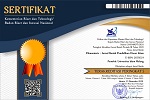SEQUENTIAL EXPLORATORY: PEMBELAJARAN SENI TARI BAGI CALON GURU MADRASAH IBTIDAIYAH DI MASA PANDEMI COVID-19.
DOI:
https://doi.org/10.33474/elementeris.v2i1.6888Abstract
This study aims to analyze: 1) the learning conditions of dance during the Covid 19 pandemic; and 2) media, learning methods, and learning resources used in learning dance for prospective Madrasah Ibtidaiyah teachers during the pandemic Covid 19. Learning dance for prospective Madarasah Ibtidaiyah teachers was chosen as the theme and / or part of the research variable based on the consideration that it has complex problems during the Covid Pandemic period 19. This research is a mixed method research with sequential exploratory research type. The research subjects consisted of 34 prospective Madrasah Ibtidaiyah teachers who were taking dance education courses at the Madrasah Ibtidaiyah Teacher Education Study Program, Islamic University of Malang. Data collection techniques are done through indirect interviews (personal chat, email, and Google form) and documentation (video dance assignments). The results showed that: 1) the learning conditions before and during the Covid 19 pandemic were very different. In fact 85% of prospective teachers state that learning dance is more comfortable to be carried out before the Covid pandemic 19. Only 31% of prospective teachers feel the effectiveness of dance learning. 2) Online learning media (tools) in the form of whatsapp applications, a combination of question and answer methods, discussions, lectures and hands-on practice, and YouTube as a reference source chosen and declared effective in learning dance during the Covid 19 pandemic.References
Arisyanto, P., Untari, M. F. S., & Sundari Riris Setyo. (2019). Penerapan Strategi Practice Rehearsal Pairs Pada Mata Kuliah Seni Tari dan Drama di UPGRIS. Refleksi Edukatika: Jurnal Ilmiah Kependidikan, 10(1), 1–9.
Brasmati. (2020). Tak Ingin Grusa-grusu, Jokowi Masih Godok Penerapan New Normal di Sektor Pendidikan. Tribunnews, 1–4. Tak Ingin Grusa-grusu, Jokowi Masih Godok Penerapan New Normal di Sektor Pendidikan
Cnn/ysp. (2020). Terbaru Dari Kemendikbud, Belajar di Rumah Akan Diperpanjang Hingga Akhir 2020. Liputan 6, 1. http://www.belajardirumah.org/2020/05/terbaru-dari-kemdikbud-belajar-di-rumah.html
Creswell W. John. (2011). Educational Research: Planning, Conducting, and Evaluating Quantitative and Qualitative Research.
Dewi, M. S. (2017). Peran dan Tantangan Guru Raudhatul Atfhal Masa Kini. In F. Anita (Ed.), Pendidikan Islam Dalam Tantangan Globalisasi (1st ed., p. 117). Nirmana Media.
Ihsanuddin. (2020). Fakta Lengkap Kasus Corona di Indonesia. Kompas.Com, 1. https://nasional.kompas.com/read/2020/03/03/06314981/fakta-lengkap-kasus-pertama-virus-corona-di-indonesia?page=all
Komalasari, H. (2001). Aplikasi model pembelajaran tari pendidikan di sdn nilem bandung.
Lokasari Novian Murti. (2013). Proses Pembelajaran Mahasiswa Seni Tari Pada. Universitas Negeri Makasar.
Nurkholis, M. (2021). Keefektivan Kebijakan E-Learning berbasis Sosial Media pada PAUD di Masa Pandemi Covid-19 Abstrak. Jurnal Obsesi: Jurnal Pendidikan Anak Usia Dini, 5(1), 212–228. https://doi.org/10.31004/obsesi.v5i1.535
Park, S., & Yun, H. (2018). The Influence of Motivational Regulation Strategies on Online Students’ Behavioral, Emotional, and Cognitive Engagement. American Journal of Distance Education, 32(1), 43–56. https://doi.org/10.1080/08923647.2018.1412738
Priyanto, W. P. (2011). Pengembangan Media E-Learning Pada Pembelajaran Seni Tari SMP Negeri di Kabupaten Sleman. http://staffnew.uny.ac.id/upload/131644621/penelitian/ringkasan-pengenm-media-tari-di-smp.pdf
Retnoningsih, D. A. (2017). Eksistensi Konsep Seni Tari Tradisional Terhadap Pebentukan Karakter Siswa Sekolah Dasar. DIALEKTIKA Jurnal Pemikiran Dan Penelitian Pendidikan Dasar, 7(1), 20–29.
Russell-Bowie, D. E. (2013). What? Me? Teach dance? Background and confidence of primary preservice teachers in dance education across five countries. Research in Dance Education, 14(3), 216–232. https://doi.org/10.1080/14647893.2012.722614
Saripuddin, Haris, A., & Nurhadi. (2014). Perancangan Aplikasi Media Pembelajaran Seni Budaya Berbasis Multimedia Pada Smp Db 1 Kota Jambi. Jurnal Ilmiah Media Processor, 9(1), 44–53.
Setiawan, A. (2013). Pemanfaatan Internet Sebagai Media Pembelajaran Seni Musik di SMP Negeri 2 Tonjong Kabupaten Brebes [Universitas Negeri Semarang]. https://lib.unnes.ac.id/19564/1/2503406007.pdf
Zhafira, N. H., Ertika, Y., & Chairiyaton. (2020). Persepsi Mahasiswa Terhadap Perkuliahan Daring Sebagai Sarana Pembelajaran Selama Masa Karantina Covid-19. Jurnal Bisnis Dan Kajian Strategi Manajemen, 4(1), 37–45.
Downloads
Published
Issue
Section
License
The journal operates an Open Access policy under a Creative Commons Non-Commercial 4.0 International license. Authors who publish with this journal agree to the following terms:
- Authors retain copyright and grant the journal right of first publication with the work simultaneously licensed under a Commons Attribution-NonCommercial 4.0 International License
that allows others to share — copy and redistribute the material in any medium or format, and adapt — remix, transform, and build upon the material.
- Authors are able to enter into separate, additional contractual arrangements for the non-exclusive distribution of the journal's published version of the work (e.g., post it to an institutional repository or publish it in a book), with an acknowledgement of its initial publication in this journal.
- Authors are permitted and encouraged to post their work online (e.g., in institutional repositories or on their website) prior to and during the submission process, as it can lead to productive exchanges, as well as earlier and greater citation of published work.
Elementeris: Jurnal Ilmiah Pendidikan Dasar Islam by Universitas Islam Malang is licensed under a Creative Commons Attribution-NonCommercial 4.0 International License.
Based on a work at http://riset.unisma.ac.id/index.php/je/index.















